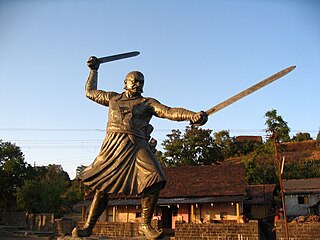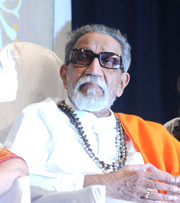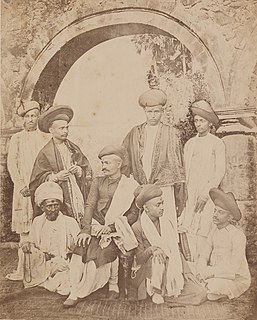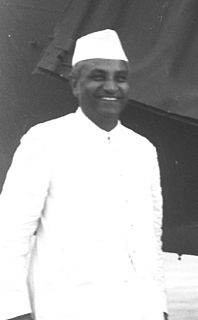Related Research Articles

The Maratha caste was originally formed from the amalgamation of families from the agricultural castes in Maharashtra who took to military service under the various Muslim rulers and later in the armies of Shivaji and earned vatans and inams in return.

Baji Prabhu Deshpande was a commander of Shivaji, the founder of the Maratha empire. The well celebrated legend of Baji Prabhu is intricately linked with an important rear guard battle enabling Shivaji's escape from Panhala fort; he was the hero who sacrificed his life for his king.

Pathare Prabhu is one of the Hindu communities in the city of Mumbai.

Bhalchandra Trimbak Ranadive, popularly known as BTR was an Indian communist politician and trade union leader.
Kulkarni is a family name native to the Indian state of Maharashtra and northern Karnataka. It is found among the Brahmin communities of these states such as Deshastha, Karhade and also among the Chandraseniya Kayastha Prabhu (CKP) community. The reason the Kulkarni was a Brahmin or CKP was because literacy was mandatory for the office. The Kulkarni operated at the village level but at a Pargana level he was known as a "Deshkulkarni", Deshpande or Nadkarni.

Kayastha is a group consisting of a cluster of several different castes of different origin in India. Kayasthas have traditionally acted as scribes, keepers of public records and accounts, and administrators of the state. They have dual caste status of Brahmin and Kshatriya.
The Chitpavan Brahmin or Kokanastha Brahmin is a Hindu Maharashtrian Brahmin community inhabiting Konkan, the coastal region of the state of Maharashtra in India. The community came into prominence during the 18th century when the heirs of Peshwa from the Bhat family of Balaji Vishwanath became the de facto rulers of the Maratha empire. Under the British Raj, they were the one of the Hindu communities in Maharashtra to flock to western education and they provided the bulk of social reformers, educationalists and nationalists of the late 19th century. Until the 18th century, the Chitpavans were held in low esteem by the Deshastha, the older established Brahmin community of Maharashtra region.
Deshpande is a surname native to the Indian state of Maharashtra. The surname can be also found in northern parts of Karnataka state. Deshpande surname is found among the Deshastha Brahmins, Goud Saraswat Brahmins(GSB) and the Chandraseniya Kayastha Prabhus(CKP).
Chandraseniya Kayastha Prabhu (CKP) is an ethno-religious clan of South Asia. Traditionally, the CKPs have the upanayana and have been granted the rights to study the vedas and perform vedic rituals along with the Brahmins. Ritually ranked very high, they may be considered socially proximate to the Maharashtrian Brahmin community. They have traditionally been an elite and literate but a numerically small community.
Kotnis is the surname found in multiple communities in Maharashtra. It can belong to the Deshastha Brahmin of Madhwa Sect., Saraswats or Chandraseniya Kayastha Prabhu(CKP).

The Nagar Brahmins are a social caste found primarily in Gujarat, but also in Rajasthan, Malwa and in states of Maharashtra, Madhya Pradesh, Uttar Pradesh, Bihar even as far as Haryana in the north, West Bengal in the east and Karnataka in the south. In North India, they form the Bias Brahmin community along with Audichya,Bardai and Barai sub-castes.
Kushabhau Thakre was an Indian politician belonging to Bharatiya Janata Party and Member of parliament.
Bendre is an Indian surname native to the state of Maharashtra and Konkan coast. Typically it is found in the Marathi Chandraseniya Kayastha Prabhu or in the Chitpawan community

Jivraj Narayan Mehta was the first Chief Minister of Gujarat.

Keshav Sitaram Thackeray, was an Indian social reformer who campaigned against superstitions and social evils in India such as Untouchability, Child marriage and Dowry. He was also a prolific author. He was one of the key leaders of the Samyukta Maharashtra Samiti which successfully campaigned for the linguistic state of Maharashtra. He was the father of Bal Thackeray, who founded the Shiv Sena, a pro-Marathi Hindu nationalist party leader. He is also the grandfather of Shiv Sena leader & Current Chief Minister of Maharashtra Uddhav Thackeray and Maharashtra Navnirman Sena chief Raj Thackeray. There is a school in Pune named after him.

Swami Kuvalayananda was a researcher and educator who is primarily known for his pioneering research into the scientific foundations of yoga. He started scientific research on yoga in 1920, and published the first scientific journal specifically devoted to studying yoga, Yoga Mimamsa, in 1924. Most of his research took place at the Kaivalyadhama Health and Yoga Research Center at Lonavla which he founded in 1924. His influence on the development of yoga as exercise has been "profound".
Jagannath Wani was an Indo-Canadian statistician and philanthropist. A Professor Emeritus of Statistics and Actuarial Science at the University of Calgary, his philanthropic work in Canada has focused on mental illness, fund raising for the less fortunate in India and promotion of India’s art and culture and multi culturalism in North America. He was conferred the Order of Canada, the highest civilian honour of Canada, on May 3, 2013.
Narayan Jagannath Vaidya was the first deputy inspector of Sindh. At the time, it was part of the Bombay Presidency. He was the brother of Lakshman Jagannath Vaidya. He belonged to the CKP community of Maharashtra.The Narayan Jagannath High School in Pakistan is named after him.
Bhalchandra Vaidya, also known as Bhai Vaidya, was an Indian politician who served as the Home Minister of the Indian state of Maharashtra, an revolutionary, Member of Legislative Assembly of the state of Maharashtra, Mayor of Pune city, veteran Socialist leader and head of the Socialist Party of India.
The Prabhu communities are a group of distinct Hindu castes found in Maharashtra, India. There are four such castes, all having different ritual and social status within the caste system of Maharashtra. They are Chandraseniya Kayastha Prabhu, Pathare Prabhu, Kanchole Prabhus, Bhatt Prabhus and the Danved Prabhu.
References
- ↑ Professor Dr.Mrudula Verma; Professor Dr.Sarjerao Bhamare; Professor Shripad Nandedkar; Dr.Mokashi (RK Taleja College) (2015). Sanshodhak. Historian V.K.Rajwade Research center(mandal), Dhule, India. p. 1–14.
quote on page 1; Not much information is available about the early life of Narayan Jagannatha Vaidya. Narayan Jagannatha Vaidya belonged to the Chandraseniya Kayastha Prabhu(CKP) community of Maharashtra. His brother was the Diwan of Baroda state
Italic or bold markup not allowed in:|publisher=(help) - ↑ The Bombay University Calendar, Volume 2. University of Bombay. 1925. p. 582.
Paper for the foundation of a Scholarship to be called " The Dewan Bahadur Lakshman Jagannath Vaidya Scholarship " and to be awarded to a Candidate of the Kayastha Prabhu community who passes the Matriculation Examination with the highest number..
- ↑ The Bombay University Calendar, Volume 1. 1908. p. 490.
LAKSHMAN. JAGANNATH. VAIDYA. SCHOLARSHIP. The Secretary to the Kayastha Prabhu Educational Fund, Baroda, in a letter dated 2nd February 1887, offered to the University a sum of Rs. 5,000 in Government 4 per cent. Paper for the foundation of a Scholarship to be called " The Dewan Bahadur Lakshman Jagannath Vaidya Scholarship " and to be awarded to a Candidate of the Kayastha Prabhu community who passes the Matriculation Examination with the highest number
| This Indian biographical article is a stub. You can help Wikipedia by expanding it. |